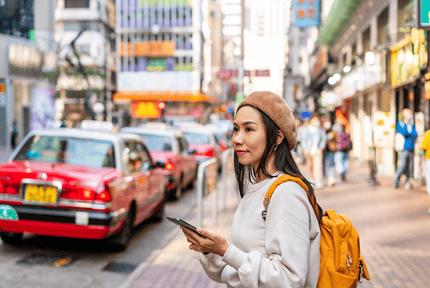

Hong Kong Travel Guide
Best ways to experience Hong Kong
While Hong Kong may be small in size, it certainly packs an plenty of interesting and unique attractions into its urban landscape.
So, where should you begin when visiting this vibrant city?
While you’ll struggle to experience everything Hong Kong has to offer in one trip, here are a few key highlights that capture the essence of this dynamic and cosmopolitan destination.
● Take a ride on a Ding Ding – For a quintessentially Hong Kong experience, you have to take a ride on one of the city’s iconic ‘Ding Ding’ trams. A very budget-friendly way to explore Hong Kong, you’ll be able to enjoy scenic views of the city’s skyline, Victoria Harbour, bustling markets and other landmarks. With their double-decker cabins, open windows and vintage design, there are few better ways to take in all the sights and sounds. Jump on a regular Ding Ding for an authentic experience, or find a tour tram which is kitted out with speakers which sharing interesting facts about the city and its history.
● Ride the Central Mid-Levels Escalator – While we wouldn’t normally feature an escalator ride on our must-do travel lists, but this is no ordinary escalator. Spanning 800 metres, it’s the longest outdoor covered escalator system in the world. With areas where you can hop on and hop off, it’s a great way to explore Hong Kong on foot alongside locals going about their day. Just note the escalator changes direction depending on the time of day—it moves downhill to get residents from their homes to work between 6 am and 10 am, then changes direction to move uphill from 10 am.
● Stroll the Tsim Sha Tsui Promenade – This scenic waterfront promenade offers impressive views of Victoria Harbour, Hong Kong Island’s skyline and the iconic Symphony of Lights show in the evenings. The promenade is lined with benches and public art installations, providing a perfect spot to relax and take in the surroundings. You’ll also find The Avenue of Stars, a walkway dedicated to Hong Kong’s film industry, featuring handprints of celebrities and statues. Whether you visit at day or night, the Tsim Sha Tsui Promenade is an unforgettable example of Hong Kong’s beauty and charm.
● Sample the local delicacies – Hong Kong boasts a rich culinary scene with a variety of delicious local delicacies that every visitor needs to try. Sampling a Hong Kong Dim Sum is a must, but makes sure you also keep an eye out for things like Pineapple Buns (Bolo Bao), Roast Goose, Egg Waffles (Gai Daan Jai) and Fish Balls. If you’re feeling adventurous, you can even find local cuisines like chicken feet, pigs ears and other daring delicacies!
● Soak in the views from Victoria Peak – The highest point on Hong Kong Island, Victoria Peak is a must-visit tourist attraction where you can take in breath-taking views of the city skyline and Victoria Harbour. Get there by enjoying a scenic ride on the Peak Tram that ascends steep slopes surrounded by lush greenery, then choose to take in the views the way you want. Head up to the observation decks for 360-degree views, take a short stroll to the open-air Lions Pavilion Viewpoint, or wander along the nearby walking paths to take in the lush surroundings.
Visiting Hong Kong
Climate
Hong Kong experiences a subtropical climate with distinct seasons.
Summers (June to August) are hot and humid, with temperatures often reaching 30-35°C with frequent thunderstorms. Autumn (September to November) brings cooler and drier weather, making it a pleasant time to visit. Winters (December to February) are mild, with temperatures ranging from 12-18°C, while spring (March to May) sees increasing temperatures and humidity.
Autumn and spring tend to be the best times to visit Hong Kong when the weather is more moderate and comfortable, which is ideal for exploring the city’s attractions and outdoor activities.
Culture and language
The official languages of Hong Kong are Chinese (Cantonese) and English, with both widely used. Cantonese is the predominant Chinese dialect spoken, but Mandarin is also understood in most areas.
The culture in Hong Kong is a fascinating blend of Eastern and Western influences, shaped by its colonial history and cosmopolitan character. Traditional Chinese customs and values coexist with modern, global perspectives, creating a dynamic and multicultural society. The people of Hong Kong are also known for their resilience, entrepreneurial spirit and strong sense of community.
Cantonese cuisine is a central aspect of Hong Kong’s culture, featuring a diverse range of dishes from street food to gourmet dining. The city also embraces international cuisines, reflecting its status as a global hub. Hong Kong’s arts scene is vibrant, with a mix of traditional Chinese art, contemporary galleries and world-class performances, and traditional festivals such as Chinese New Year and Mid-Autumn Festival are widely celebrated.
It’s important to be aware that Hong Kong upholds very strict laws relating to national security and individuals can be detained for offences for up to 16 days without charge. It’s a smart idea to research the local laws before travelling.
Getting around
Hong Kong is split into two sides separated by Victoria Harbour (with Kowloon on the mainland and Hong Kong Island to the south of the harbour), but the city’s well-developed transportation network makes it very easy to get around.
The Mass Transit Railway (MTR) system is extensive and connects key areas of Hong Kong Island, Kowloon and the New Territories, and is a convenient way to travel between major attractions. The iconic Star Ferry also provides a scenic and affordable way to cross Victoria Harbour between Hong Kong Island and Kowloon.
Hong Kong also has an extensive bus network, it’s iconic vintage trams (Ding Dings), and ferries serving outlying islands. Taxis are also readily available, but traffic during peak hours can be congested.
Make sure you purchase an Octopus card which will allow you to use Hong Kong’s MTR, buses, trams and ferries. You can even use it at most convenience stores, supermarkets, fast-food chains, vending machines and more!
Accommodation
You’ll find a few different accommodation options throughout Hong Kong including hotels, hostels and guesthouses, serviced apartments, bed and breakfasts, resorts and private rentals.
Generally, accommodation in Hong Kong tends to be more expensive compared to many other Southeast Asian destinations, however you can find budget-friendly options.
Entry requirements
Australian’s generally won’t need a tourist visa to visit Hong Kong if you stay less than 90 days. If you’ll also be visiting China during your trip, you will need to obtain a visa for the Peoples Republic of China.
It’s a good idea to visit the Australian government’s Smartraveller website before your trip for the latest information and updates about travelling to Hong Kong.
All benefits and covers are subject to the terms, conditions, limitations and exclusions listed in the Combined Financial Services Guide and Product Disclosure Statement (PDS) and on other policy documentation, including the schedule.
Hong Kong travel insurance FAQs
It’s always a good idea to get travel insurance when travelling to Hong Kong, so you know you’re prepared if something doesn’t go to plan. From medical emergencies to lost luggage, travel insurance can come in handy in a variety of situations. Choosing cover that also offers instant claims can also be invaluable while travelling abroad.
The best way to find out how much it will cost to get cover to travel to Hong Kong is to get an instant quote with PassportCard. It only takes a couple of minutes to get a personalised quote by providing some basic details such as your age, destination/s, travel dates and the level of cover you would like
No. Many Australians don’t realise that they won’t be covered by Medicare when overseas. Purchasing travel insurance with cover for medical emergencies and evacuation is essential to ensure you won’t be left to foot the bill if you become seriously sick or injured while travelling.
Simply call our Global Assistance team on +61 1800 490 478 or contact us on WhatsApp. Our Australian-based Global Assistance team is available 24/7 and can quickly handle most common claims on-the-spot over the phone.
Preparing for your trip to Hong Kong
All set for your trip to Hong Kong? Here are some helpful tips to ensure your trip is as enjoyable as possible:
● Check your passport is valid with at least 6 months of validity left from the date you plan to leave the country
● Ensure you meet the visitor entry requirements for Hong Kong and have obtained the relevant visa before your departure
● Speak to your doctor to check if you’ll need any vaccinations. Your doctor may recommend vaccination against Hepatitis A and B, Typhoid, Tuberculosis, Japanese Encephalitis and Rabies in addition to the regular schedule of immunizations
● Hong Kong can experience high levels of air pollution which may trigger bronchial, sinus or asthma conditions. Ensure you carry any medications with you wherever you go outside
● Notify your financial institution of your plans to travel and arrange a travel currency card or another method of payment to cover expenses while you’re away. While Hong Kong is a largely cashless society and card payments are widely accepted, it’s still a good idea to take some Hong Kong Dollars (HKD) with you.
● Contact your phone provider to ensure your phone plan will cover you while you’re away or purchase a pre-paid international sim card
● Arrange your accommodation in advance for each location you plan to stay in
● Consider booking any trips, tours or activities you want to do in advance, particularly if you will be visiting during peak season when things can get very busy
● Provide details of your travel plans to a family member or close friend not travelling with you so you can be contacted in case of an emergency
● Save the details of how to access emergency consular assistance in case you need it
● Organise your travel insurance with PassportCard.












